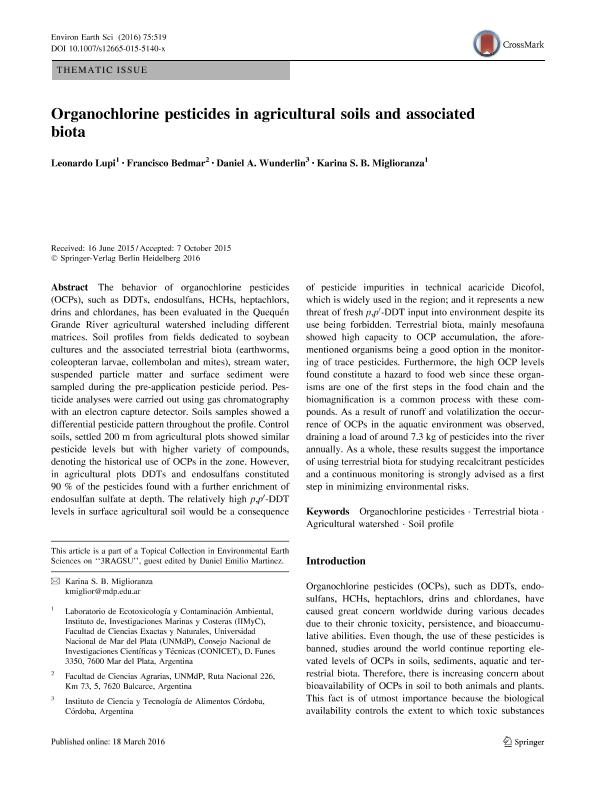Mostrar el registro sencillo del ítem
dc.contributor.author
Lupi, Leonardo

dc.contributor.author
Bedmar, Francisco

dc.contributor.author
Wunderlin, Daniel Alberto

dc.contributor.author
Miglioranza, Karina Silvia Beatriz

dc.date.available
2018-06-18T15:14:49Z
dc.date.issued
2016-03
dc.identifier.citation
Lupi, Leonardo; Bedmar, Francisco; Wunderlin, Daniel Alberto; Miglioranza, Karina Silvia Beatriz; Organochlorine pesticides in agricultural soils and associated biota; Springer Verlag; Environmental Earth Sciences; 75; 6; 3-2016
dc.identifier.issn
1866-6280
dc.identifier.uri
http://hdl.handle.net/11336/48967
dc.description.abstract
The behavior of organochlorine pesticides (OCPs), such as DDTs, endosulfans, HCHs, heptachlors, drins and chlordanes, has been evaluated in the Quequén Grande River agricultural watershed including different matrices. Soil profiles from fields dedicated to soybean cultures and the associated terrestrial biota (earthworms, coleopteran larvae, collembolan and mites), stream water, suspended particle matter and surface sediment were sampled during the pre-application pesticide period. Pesticide analyses were carried out using gas chromatography with an electron capture detector. Soils samples showed a differential pesticide pattern throughout the profile. Control soils, settled 200 m from agricultural plots showed similar pesticide levels but with higher variety of compounds, denoting the historical use of OCPs in the zone. However, in agricultural plots DDTs and endosulfans constituted 90 % of the pesticides found with a further enrichment of endosulfan sulfate at depth. The relatively high p,p′-DDT levels in surface agricultural soil would be a consequence of pesticide impurities in technical acaricide Dicofol, which is widely used in the region; and it represents a new threat of fresh p,p′-DDT input into environment despite its use being forbidden. Terrestrial biota, mainly mesofauna showed high capacity to OCP accumulation, the aforementioned organisms being a good option in the monitoring of trace pesticides. Furthermore, the high OCP levels found constitute a hazard to food web since these organisms are one of the first steps in the food chain and the biomagnification is a common process with these compounds. As a result of runoff and volatilization the occurrence of OCPs in the aquatic environment was observed, draining a load of around 7.3 kg of pesticides into the river annually. As a whole, these results suggest the importance of using terrestrial biota for studying recalcitrant pesticides and a continuous monitoring is strongly advised as a first step in minimizing environmental risks.
dc.format
application/pdf
dc.language.iso
eng
dc.publisher
Springer Verlag
dc.rights
info:eu-repo/semantics/openAccess
dc.rights.uri
https://creativecommons.org/licenses/by-nc-sa/2.5/ar/
dc.subject
Agricultural Watershed
dc.subject
Organochlorine Pesticides
dc.subject
Soil Profile
dc.subject
Terrestrial Biota
dc.subject.classification
Otras Ingeniería Química

dc.subject.classification
Ingeniería Química

dc.subject.classification
INGENIERÍAS Y TECNOLOGÍAS

dc.title
Organochlorine pesticides in agricultural soils and associated biota
dc.type
info:eu-repo/semantics/article
dc.type
info:ar-repo/semantics/artículo
dc.type
info:eu-repo/semantics/publishedVersion
dc.date.updated
2018-06-12T18:41:08Z
dc.identifier.eissn
1866-6299
dc.journal.volume
75
dc.journal.number
6
dc.journal.pais
Estados Unidos

dc.journal.ciudad
New York
dc.description.fil
Fil: Lupi, Leonardo. Consejo Nacional de Investigaciones Científicas y Técnicas. Centro Científico Tecnológico Conicet - Mar del Plata. Instituto de Investigaciones Marinas y Costeras. Universidad Nacional de Mar del Plata. Facultad de Ciencia Exactas y Naturales. Instituto de Investigaciones Marinas y Costeras; Argentina
dc.description.fil
Fil: Bedmar, Francisco. Universidad Nacional de Mar del Plata. Facultad de Ciencias Agrarias; Argentina
dc.description.fil
Fil: Wunderlin, Daniel Alberto. Consejo Nacional de Investigaciones Científicas y Técnicas. Centro Científico Tecnológico Conicet - Córdoba. Instituto de Ciencia y Tecnología de Alimentos Córdoba. Universidad Nacional de Córdoba. Facultad de Ciencias Químicas. Instituto de Ciencia y Tecnología de Alimentos Córdoba; Argentina
dc.description.fil
Fil: Miglioranza, Karina Silvia Beatriz. Consejo Nacional de Investigaciones Científicas y Técnicas. Centro Científico Tecnológico Conicet - Mar del Plata. Instituto de Investigaciones Marinas y Costeras. Universidad Nacional de Mar del Plata. Facultad de Ciencia Exactas y Naturales. Instituto de Investigaciones Marinas y Costeras; Argentina
dc.journal.title
Environmental Earth Sciences
dc.relation.alternativeid
info:eu-repo/semantics/altIdentifier/url/https://link.springer.com/article/10.1007%2Fs12665-015-5140-x
dc.relation.alternativeid
info:eu-repo/semantics/altIdentifier/doi/http://dx.doi.org/10.1007/s12665-015-5140-x
Archivos asociados
